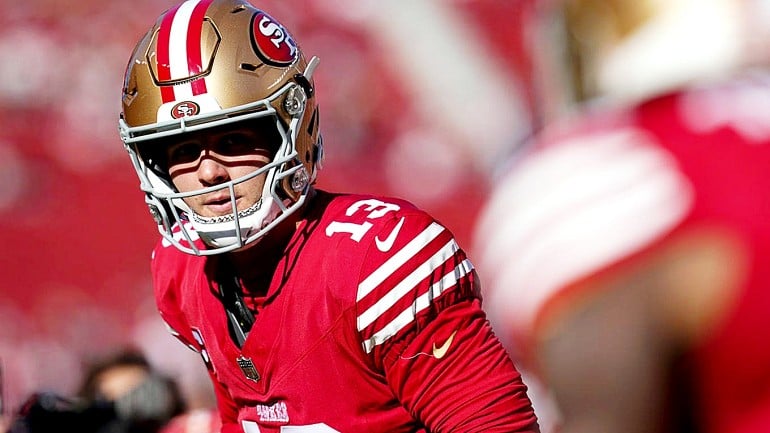The San Francisco 49ers finally got a deal done with star defensive end Nick Bosa, who earned a five-year, $170 million extension, making him the highest-paid defensive player in the NFL, while receiving $122.5 million in total guarantees and a $50 million signing bonus, all record-breaking marks for a non-quarterback.
Let's break down the entirety of Nick Bosa's deal and what it means for the 49ers.
The Contract
Like I said above, Bosa earned a five-year extension worth $170 million, with $122.5 million in total guarantees and a $50 million signing bonus.
Bosa's $34 million-per-year salary may seem like a crazy figure, given the monetary value attached, but it's more-so a similar raise to what his brother Joey Bosa earned during his five-year, $135 million contract extension, with the expected year-to-year inflation involved.
Bosa earned a 7.4% raise from Aaron Donald's $31.6 million salary on his three-year extension, similar to his brother's 8% raise when jumping from Myles Garret's $25 million average annual value to $27 million back in 2020.
Additionally, Bosa's $122.5 million in total guarantees covers 72% of his overall contract value, similar to his brother's $102 million in total guarantees, which covered around 75% of his total contract.
While the guaranteed-at-signing money isn't clarified yet, you could expect around $95-100 million, as Joey Bosa's contract had $78 million guaranteed at signing, accounting for 57.8% of his overall contract. That number would amount to around $98 million for younger brother Nick.
Now, don't get me wrong. These numbers are certainly massive, and will require some salary maneuvering in the future for the 49ers, but this type of money was expected for Nick Bosa, especially off a year where he won the Defensive Player of the Year.
Bosa's deal also includes his fully guaranteed $17.859 million fifth-year option, totaling the full deal to six years and $187.86 million when adding in the $170 million in new money, averaging out to $31.3 million per year, which is a little easier to stomach.
Overall, Bosa's deal will keep him in San Francisco through the duration of the 2028 season, his age-31 season, placing him as a free agent ahead of his age-32 season, allowing him another chance to cash out prior to his retirement should he continue on a similar trajectory.
Now, I do have a few questions, primarily on the 49ers' side, that left me displeased with the deal.
Where the 49ers went wrong
In regards to Nick Bosa, there were some pretty high parameters set for an extension, paved by Pittsburgh Steelers edge rusher T.J. Watt, who set the market with a four-year, $112 million deal back in 2021, based on Joey Bosa's extension, which was followed by Los Angeles Rams defensive tackle Aaron Donald, who set the market again with a three-year, $95 million deal in 2022.
While the numbers are much different in the two deals, there's one thing the two market-setting deals share in common: they were done prior to this offseason.
Although an extension was likely to take some back-and-forth negotiations, one added benefit for the 49ers was that they weren't competing with other teams in setting the market at the position, as Bosa was clearly the player who was going to be the next market-setter at defensive end.
Which paves the question: Why did this deal take so long?
Back during the draft, head coach Kyle Shanahan and general manager John Lynch acknowledged that talks with Bosa and his camp weren't substantial.
Then, a report recently came out that the 49ers started heavily engaging back in talks on August 19th, with a deal finally coming to fruition this week.
In the past with prior extension talks, the 49ers had been negotiating not only with their player, but other teams as well to try and secure the best deal possible. That wasn't the case with Bosa, as the parameters, as I said, were already in place for his deal.
Had the 49ers done this deal much earlier, there would've been significant flexibility, especially if the 49ers were anyways planning to restructure tight end George Kittle and offensive tackle Trent Williams.
If Bosa's deal is backloaded, the 49ers may have nearly $30 million in cap space. But, free agency is well gone, and the majority of players that the 49ers could've added to go all-in this season are signed elsewhere.
Now, the 49ers didn't have to spend the money they created at all. But, doing these moves much earlier would've at least provided the flexibility to pull the trigger on a deal if they found value in free agency months ago.
Overall, I just don't understand the timing and lack of urgency in getting this deal done. Bosa's demands were fairly clear, and it was apparent that he'd muster a contract as significant as the one he had gotten.
Plus, with him signing before Kansas City's Chris Jones, Carolina's Brian Burns, and Minnesota's Justin Jefferson, Bosa proved that he really didn't care about being the last player of the non-quarterback bunch signed.
The 49ers should've caved and done the deal much sooner, providing Bosa more time to prepare this offseason in new defensive coordinator Steve Wilks's defense, but they tried to bargain with the wrong player and lost flexibility as a result.
- Rohan Chakravarthi
-
Written by:Writer/Reporter for 49ers Webzone



